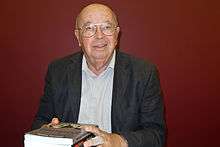Zdravko Tomac

Zdravko Tomac (Garčin, May 24, 1937) is a Croatian politician.
A native of Slavonski Brod, Zdravko Tomac began his political career in Communist Party of Yugoslavia. There he rose through the ranks, becoming close associate of Jakov Blažević. In late 1980s he became one of the chief ideologists of League of Communists of Croatia and one of the closest associates of Ivica Račan.
After Croatian Communist Party rebranded itself into Social Democratic Party of Croatia and lost 1990 parliamentary elections, Tomac worked very hard to steer the party towards the nationalist course close to Franjo Tuđman and ruling Croatian Democratic Union. Because of that, Tomac became deputy prime minister in the wartime "National Unity" government of Franjo Gregurić, thus becoming one of the first top Communist officials in Eastern Europe to return to top executive post after the fall of Berlin Wall. He served as deputy prime minister from August 1991 to June 1992.[1] There Tomac pushed for hardline policies under the pretext of helping war effort, including the curbing of press freedom and criticising human rights organisations for their meddling in Croatian internal affairs.
Because of that, many in Croatian public saw Tomac as just another of many former Communist officials who discarded their former ideology in order to embrace Croatian nationalism of Tuđman and HDZ. The only difference was in Tomac choosing to remain within the former Communist Party. This served SDP very well, which made Tomac into one of their most prominent members and thus gained enough nationalist credentials to improve its electoral chances in the long run.
Tomac showed this potential in the Croatian parliamentary election, 1995 by winning a Sabor seat in Zagreb and later serving as a Zagreb City Assembly speaker and informal opposition leader during the Zagreb Crisis.
Two years later he ran as SDP candidate at the Croatian presidential election, 1997. Although Tomac failed to unseat Tuđman, he scored an important victory for himself and his party by finishing second with 21.0% of the vote.[2] He came on top of former dissident Vladimir Gotovac and Croatian Social Liberal Party. With SDP established as the top opposition party in Croatia, it had the upper in the negotiations that would lead to 1998 pre-election pact with HSLS and victory at the Croatian parliamentary election, 2000.
Ironically, 2000 triumph proved to be the beginning of Tomac's political decline. Soon after parliamentary elections, Croatia had elections for president. SDP endorsed Dražen Budiša as its candidate and appointed Tomac to be his campaign manager. What looked like a formality turned into very unpredictable and increasingly vicious contest when Stjepan Mesić joined the fray. When the contest got narrowed to Budiša and Mesić, Tomac began to pander to nationalist and right-wing voters. This didn't have much effect and Mesić got easily elected, with Tomac's position within the party and new government becoming increasingly marginalised.
As time went by, Tomac began to drift from Račan and SDP. He began to criticise ICTY and bitterly oppose extradition of Croatian generals to Hague. Finally, in September 2003 he formally announced his departure from SDP.
He founded new party called Croatian Social Democrats (Croatian: Hrvatski socijaldemokrati), but this party, even after being allied with few small right-wing parties, failed to enter Zagreb City Assembly on 2005 local elections.
Tomac has been one of the most vocal supporters in Croatian politics of the Croats of Bosnia and Herzegovina.
Works
- Predsjednik protiv predsjednika, 2005
- Tuđmanizam i mesićizam - predsjednik protiv predsjednika, 2. dio, 2007
- Obraćenje - od komunista do vjernika, 2008
References
External links
![]() Media related to Zdravko Tomac at Wikimedia Commons
Media related to Zdravko Tomac at Wikimedia Commons